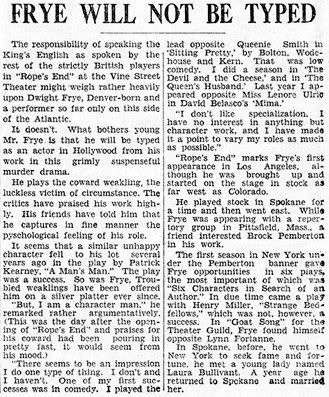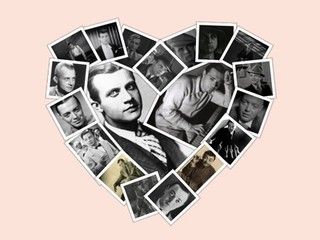Post by Mrs Vindecco on May 4, 2011 12:11:35 GMT
I suppose out of all Dwight’s plays from his career, the most familiar would be “Rope’s End” written by Patrick Hamilton and which was the first project Dwight worked on when he arrived in the west coast. The familiarity of the piece is due to Alfred Hitchcock’s experimental reworking of the play in 1948, which was a project that both the celebrated director and the original playwright were not wholly satisfied with, mainly because the one advantage film has over theatre is that a lot of the little “boring” details are edited out. However I have always had an interest in the film, long before I knew of Dwight’s association with it and several years ago I purchased a copy of the original play, first performed at London’s Strand Theatre in 1929. Much to my irritation I actually sold the text a few years later so much of what I am writing is based on a hazy memory,
Reading the London script (which I presume is identical to the version that Dwight performed in) there are a few notable differences from the movie. The action is set in London’s Mayfair and the characters all have different names with Dwight playing Charles “Granno” Granillo (the Farley Grainger equivalent). Along with his “friend” Wyndam Brandon, Granno decides to murder their fellow Oxford undergraduate as an disturbing expression of their “intellectual superiority”.
Hamilton drew inspiration from the horrific, real life murderers of Leopold and Loeb and draws upon themes of Nietzsche’s concept of the superman and homoeroticism. Obviously the latter was highly controversial in the 1920’s. When the film was produced almost twenty years later, both Cary Grant and Montgomery Clift turned down roles and the film was banned in some American cities. First performed in London’s West End in 1929, one must remember that homosexuality was illegal in the UK at that point but much to my surprise it is seems that the true relationship between Granillo and Brandon is much more overt than Hollywood’s treatment, with the characters flirting and glowing in an almost post-coitus manner after murdering their friend.
Granillo, in many respects would see Dwight in a role that would ultimately become very familiar to his fans as he plays the jittery, neurotic half of the pair and it is this behaviour that partly leads to their downfall. Despite, not appearing in any movies, Dwight was already concerned about typecasting to the extent that he promoted Rope’s End with an interview, titled “Frye will not be typed.” On the plus side, the play meant that Dwight’s superior skills on the piano, were once again in demand.
Despite Dwight’s personal reservations regarding appearing in the play, I think it would have been fascinating and it this role contributed to him getting the role of Monk in Doorway to Hell.

Reading the London script (which I presume is identical to the version that Dwight performed in) there are a few notable differences from the movie. The action is set in London’s Mayfair and the characters all have different names with Dwight playing Charles “Granno” Granillo (the Farley Grainger equivalent). Along with his “friend” Wyndam Brandon, Granno decides to murder their fellow Oxford undergraduate as an disturbing expression of their “intellectual superiority”.
Hamilton drew inspiration from the horrific, real life murderers of Leopold and Loeb and draws upon themes of Nietzsche’s concept of the superman and homoeroticism. Obviously the latter was highly controversial in the 1920’s. When the film was produced almost twenty years later, both Cary Grant and Montgomery Clift turned down roles and the film was banned in some American cities. First performed in London’s West End in 1929, one must remember that homosexuality was illegal in the UK at that point but much to my surprise it is seems that the true relationship between Granillo and Brandon is much more overt than Hollywood’s treatment, with the characters flirting and glowing in an almost post-coitus manner after murdering their friend.
Granillo, in many respects would see Dwight in a role that would ultimately become very familiar to his fans as he plays the jittery, neurotic half of the pair and it is this behaviour that partly leads to their downfall. Despite, not appearing in any movies, Dwight was already concerned about typecasting to the extent that he promoted Rope’s End with an interview, titled “Frye will not be typed.” On the plus side, the play meant that Dwight’s superior skills on the piano, were once again in demand.
Despite Dwight’s personal reservations regarding appearing in the play, I think it would have been fascinating and it this role contributed to him getting the role of Monk in Doorway to Hell.







 How they managed to fit that in I have no idea but there were warnings.
How they managed to fit that in I have no idea but there were warnings. 
